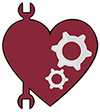Teaching
If you are interested in Cardiovascular Biomechanics and the interaction between clinicians and engineers, these courses would be of great benefit:
BMEG 470V-570V: Cardiovascular Physiology and Devices (3 credit hours).
This course describes an interdisciplinary approach of the clinical and engineering worlds to develop devices for treating cardiovascular disease. The first part of the course will be a thorough review of the relevant anatomic and physiological considerations important for developing devices. The second part of the course focuses on understanding these considerations from an engineering perspective to inform device development. This course features guest speakers from industry and academia, and includes a wet-lab with a dissection of a porcine heart.
BMEG 2813: Biomechanical Engineering (3 credit hours).
This course introduces basic concepts and principles of biomechanics to biomedical and other engineering students. The course topics include mechanics and materials, viscoelastic properties, bone, cartilage, ligament, tendon, muscle, cardiovascular dynamics, clinical gait analysis, etc. After taking this course, students are expected to understand the application of engineering kinetics to describe motions of the human body and mechanic properties of tissues. MATLAB will be used to write and solve biomechanical static and dynamic equations.
BMEG 470V: Clinical Needs Finding (1 credit hour).
This course introduces students to the technical, professional, and ethical responsibilities of a biomedical engineer in the context of engineering product design and development. Students engage in team-based projects that they identify after completing a clinical rotation in a medical facility, clinic or hospital. In the course of these projects, students engage the full scope of the engineering design process, with particular attention to clinical needs finding, problem definition, preliminary design, design iteration, prototyping, and product evaluation. Issues related to sustainability, bioethics, and health care economics are emphasized. The course prepares students to successfully select and complete a project in the senior capstone course.
In addition, Dr. Morten Jensen teaches BMEG 4813 + BMEG 4823: Senior Design I + II (3 credit hours).
This two-semester course introduces students to the basic concepts of design from a biomedical engineering perspective. Groups are organized into teams of 4-5 members. The students put together a development plan and complete an initial prototype. Students will design what is to be fabricated and tested as a medical device or software following design process and product design specification guidelines. The course consists of classroom lectures, laboratory instructions, and exercises. A combination of topics will be presented, including: technical and methodology topics from a device design perspective; components containing mechanical, electrical, optical, chemical etc. properties; technology ventures and protecting intellectual property; the FDA Medical Device Regulation and Design Control process; entrepreneurship; career planning and development; company presentations from medical device manufacturers, such as Medtronic, St. Jude Medical, Boston Scientific, etc.; sketching and drawing; design process and product design specification guidelines; design reviews; risk assessment; group project documentation, updates, and presentations.
